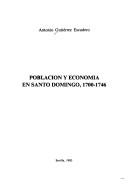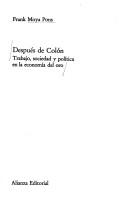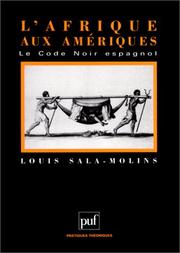| Listing 1 - 10 of 15 | << page >> |
Sort by
|
Book
ISBN: 8400047427 Year: 1980 Publisher: Sevilla : Escuela de estudios Hispano-Americanos,
Abstract | Keywords | Export | Availability | Bookmark
 Loading...
Loading...Choose an application
- Reference Manager
- EndNote
- RefWorks (Direct export to RefWorks)
Hispaniola --- History.

ISBN: 2865371859 9782865371853 Year: 1987 Publisher: Paris : Editions Karthala,
Abstract | Keywords | Export | Availability | Bookmark
 Loading...
Loading...Choose an application
- Reference Manager
- EndNote
- RefWorks (Direct export to RefWorks)
Voodooism --- Vaudou --- -Witchcraft --- -Poisoning --- Vodou --- Witchcraft --- -Vodou --- Poisoning --- Voodooism - Hispaniola --- Witchcraft - - Hispaniola --- Poisoning - - Hispaniola

ISBN: 8450518962 Year: 1985 Publisher: Sevilla : Diputación provincial,
Abstract | Keywords | Export | Availability | Bookmark
 Loading...
Loading...Choose an application
- Reference Manager
- EndNote
- RefWorks (Direct export to RefWorks)
Hispaniola --- Hispaniola --- Hispaniola --- Dominican Republic --- Economic conditions. --- Commerce --- History --- Population --- History --- History

ISBN: 8420642118 Year: 1987 Publisher: Madrid : Alianza,
Abstract | Keywords | Export | Availability | Bookmark
 Loading...
Loading...Choose an application
- Reference Manager
- EndNote
- RefWorks (Direct export to RefWorks)
Hispaniola --- Hispaniola --- Spain --- Caribbean Area --- Economic conditions. --- History --- Colonies --- Administration --- History --- History
Book
ISBN: 0511782772 1108023223 Year: 2011 Publisher: Cambridge : Cambridge University Press,
Abstract | Keywords | Export | Availability | Bookmark
 Loading...
Loading...Choose an application
- Reference Manager
- EndNote
- RefWorks (Direct export to RefWorks)
Bryan Edwards (1743-1800) was a wealthy West Indian planter, politician and historian. He vigorously opposed the abolition of the slave trade, since the sugar industry relied heavily on it. An Historical Survey of the French Colony in the Island of St. Domingo was published in 1797. St Domingo (now Haiti) had been one of the most prosperous West Indian economies, producing more sugar and coffee than all the British West Indies combined. The harsh treatment of the slaves under the French code noir led to a widespread revolt in 1791, in part inspired by the French Revolution. An alliance between white planters and the British to take over the island was unsuccessful. Edwards feared that the revolt would spread to other islands, destroying their trade. The rebellion in St Domingo was of major significance, as it led to the colony becoming the first independent black-ruled republic in 1804.
Hispaniola --- History --- Politics and government --- Española --- Haiti (Island) --- La Española --- Santo Domingo Island --- Antilles, Greater

ISBN: 2130448364 Year: 1992 Volume: vol *19 Publisher: Paris : PUF - Presses Universitaires de France,
Abstract | Keywords | Export | Availability | Bookmark
 Loading...
Loading...Choose an application
- Reference Manager
- EndNote
- RefWorks (Direct export to RefWorks)
Blacks --- Noirs --- Legal status, laws, etc. --- Colonies --- Droit --- Législation --- Slavery --- History --- Law and legislation --- Colonies. --- Législation --- Hispaniola --- Codigo negro carolino --- Black people --- ESCLAVAGE ET L'EGLISE --- ESCLAVES --- CONDITIONS SOCIALES
Book
ISBN: 1469626888 9781469626888 9781469626871 146962687X 9781469626864 1469626861 9798890845863 Year: 2016 Publisher: Chapel Hill
Abstract | Keywords | Export | Availability | Bookmark
 Loading...
Loading...Choose an application
- Reference Manager
- EndNote
- RefWorks (Direct export to RefWorks)
Reinterpreting the Haitian Revolution as both an islandwide and a circum-Caribbean phenomenon, Graham Nessler examines the intertwined histories of Saint-Domingue, the French colony that became Haiti, and Santo Domingo, the Spanish colony that became the Dominican Republic. Nessler argues that the territories' borders and governance were often unclear and mutually influential.
Slavery --- Slaves --- Abolition of slavery --- Antislavery --- Enslavement --- Mui tsai --- Ownership of slaves --- Servitude --- Slave keeping --- Slave system --- Slaveholding --- Thralldom --- Crimes against humanity --- Serfdom --- Slaveholders --- Enslaved persons --- Persons --- Law and legislation --- History. --- Social conditions. --- Emancipation --- Dominican Republic --- Haiti --- Hispaniola --- Española --- Haiti (Island) --- La Española --- Santo Domingo Island --- Antilles, Greater --- History
Book
ISBN: 0511790155 1108024602 Year: 2012 Publisher: Cambridge : Cambridge University Press,
Abstract | Keywords | Export | Availability | Bookmark
 Loading...
Loading...Choose an application
- Reference Manager
- EndNote
- RefWorks (Direct export to RefWorks)
William Walton (?1783-1857) was British agent at Santo Domingo (Haiti), one of the two states on the island of Hispaniola, over which the British had briefly fought with the French before it proclaimed its independence in 1804. Returning to England in 1809 he began to write on Spanish and South American affairs. This work was published in two volumes in 1810. Volume 2 examines the Spanish settlements on the American mainland, in California, Texas, Mexico and particularly in South America. Walton first considers the administration of these colonies. He discusses the origins of the native peoples, and the impact on them of colonization; having studied their culture, he believed that in some respects they were more advanced than Europeans. He then discusses the Spanish and Creole inhabitants of South America, and its climate and resources. Walton's object was to encourage the growth of trade between Britain and the region.
Spain --- Hispaniola --- Colonies --- History --- Española --- Haiti (Island) --- La Española --- Santo Domingo Island --- Antilles, Greater --- Espagne --- Espainiako Erresuma --- España --- Espanha --- Espanja --- Espanya --- Estado Español --- Hispania --- Hiszpania --- Isupania --- Kingdom of Spain --- Regne d'Espanya --- Reiaume d'Espanha --- Reino de España --- Reino d'Espanya --- Reinu d'España --- Sefarad --- Sepharad --- Shpanie --- Shpanye --- Spanien --- Spanish State --- Supein --- イスパニア --- スペイン
Book
ISBN: 0511790147 1108024599 Year: 2011 Publisher: Cambridge : Cambridge University Press,
Abstract | Keywords | Export | Availability | Bookmark
 Loading...
Loading...Choose an application
- Reference Manager
- EndNote
- RefWorks (Direct export to RefWorks)
William Walton (?1783-1857) was British agent at Santo Domingo (Haiti), one of the two states on the island of Hispaniola, over which the British had briefly fought with the French before it proclaimed its independence in 1804. Returning to England in 1809 he began to write on Spanish and South American affairs. This work was published in two volumes in 1810. Volume 1 deals with Hispaniola, which was settled by both the Spanish and French, and officially divided in 1697. Haiti was now independent, but the other part (now the Dominican Republic) remained under Spanish control until 1821. Walton discusses the history and geography of the island, and particularly the natural resources and wildlife. The rebellion of Haiti had seriously damaged the economy, Walton's object was to encourage the growth of trade between Britain and the region.
Spain --- Hispaniola --- Colonies --- History --- Española --- Haiti (Island) --- La Española --- Santo Domingo Island --- Antilles, Greater --- Espagne --- Espainiako Erresuma --- España --- Espanha --- Espanja --- Espanya --- Estado Español --- Hispania --- Hiszpania --- Isupania --- Kingdom of Spain --- Regne d'Espanya --- Reiaume d'Espanha --- Reino de España --- Reino d'Espanya --- Reinu d'España --- Sefarad --- Sepharad --- Shpanie --- Shpanye --- Spanien --- Spanish State --- Supein --- イスパニア --- スペイン
Book
ISBN: 9781108776967 9781108477659 9781108702485 1108477658 1108801366 1108806392 1108776965 Year: 2020 Publisher: Cambridge : Cambridge University Press,
Abstract | Keywords | Export | Availability | Bookmark
 Loading...
Loading...Choose an application
- Reference Manager
- EndNote
- RefWorks (Direct export to RefWorks)
Islanders and Empire examines the role smuggling played in the cultural, economic, and socio-political transformation of Hispaniola from the late sixteenth to seventeenth centuries. With a rare focus on local peoples and communities, the book analyzes how residents of Hispaniola actively negotiated and transformed the meaning and reach of imperial bureaucracies and institutions for their own benefit. By co-opting the governing and judicial powers of local and imperial institutions on the island, residents could take advantage of, and even dominate, the contraband trade that reached the island's shores. In doing so, they altered the course of the European inter-imperial struggles in the Caribbean by limiting, redirecting, or suppressing the Spanish crown's policies, thus taking control of their destinies and that of their neighbors in Hispaniola, other Spanish Caribbean territories, and the Spanish empire in the region.
Smuggling --- Contraband trade --- Crime --- Customs administration --- History --- Hispaniola --- Spain --- Española --- Haiti (Island) --- La Española --- Santo Domingo Island --- Antilles, Greater --- Espagne --- Espainiako Erresuma --- España --- Espanha --- Espanja --- Espanya --- Estado Español --- Hispania --- Hiszpania --- Isupania --- Kingdom of Spain --- Regne d'Espanya --- Reiaume d'Espanha --- Reino de España --- Reino d'Espanya --- Reinu d'España --- Sefarad --- Sepharad --- Shpanie --- Shpanye --- Spanien --- Spanish State --- Supein --- イスパニア --- スペイン --- Commerce --- Politics and goverment --- Colonies --- Administration --- Politics and government
| Listing 1 - 10 of 15 | << page >> |
Sort by
|

 Search
Search Feedback
Feedback About
About Help
Help News
News